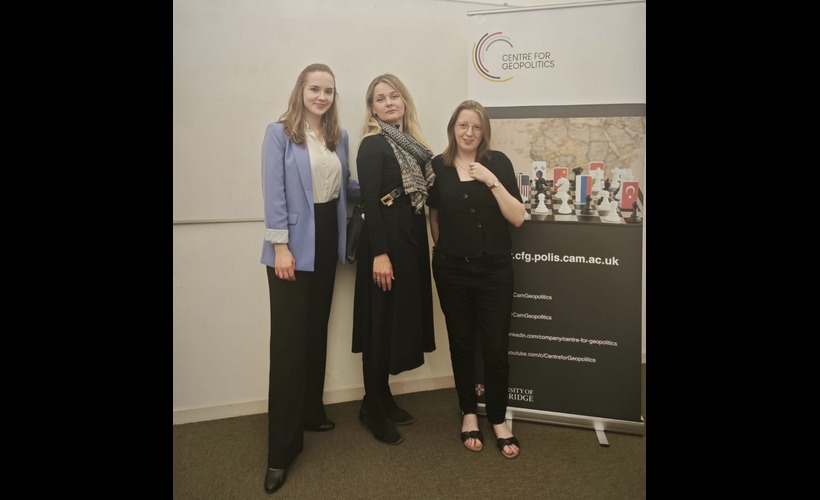Brendan Simms, Director of the Centre for Geopolitics, spoke with Mr Ross Allen, the new British Ambassador to Estonia
1. How far did Estonia react to the Belarussian crisis?
Estonia has reacted strongly to the crisis, supporting significant sanctions on the Lukashenko regime. The fact that sanctions are coordinated between the EU, UK, US and others has been powerful but clearly we need to keep up the pressure. Estonia characterises Lukashenko’s recent actions (deliberately facilitating migration into Lithuania, Latvia and Poland) in the same way as the other Baltic states, i.e. as hybrid warfare. Estonia has provided direct assistance to the Lithuanians in terms of managing the situation on the border effectively. The UK and Estonia share information and discuss how to handle Belarus regularly.
2. What is your opening impression of the position of the Russian minority in Estonia?
This can only be an opening impression, given how new I am here. I am keen to spend more time soon talking to Russian-speakers, with my Russian-speaking colleagues (I learnt Estonian ahead of coming here). The fundamental point is that the Russian-speaking minority here enjoys full political rights, and those who are not citizens already can become citizens through a straightforward process. Clearly there are big differences in terms of how well integrated different communities are, with geography, age, economic opportunities, education, language, and what sort of media people consume (Russian-language Estonian media vs media coming from Russia and toeing the Kremlin line), all relevant.
3. How has Brexit changed British policy towards the Baltic states?
Our policy remains to achieve as much as possible with the Baltic states, across both security and prosperity. Taking Estonia as an example, as it is where I am, we already have a very strong defence and security partnership: we are NATO allies, the UK is the framework nation for the enhanced Forward Presence here (some 850 troops), and we work closely on everything from cyber to Russia, Belarus and China. We tend to see all those challenges in much the same way. We also have strong economic ties: a good example is the recent listing on the London stock exchange of the UK/Estonian company “wise” (formerly Transferwise). I see part of my role as ensuring that we have a really strong and broad-based relationship across both security and prosperity.
4. What impact do you think BREXIT has had on Estonian attitudes to the UK?
Estonians tell me they were sad that we left the EU and that they miss our influence within it. But they are also clear that they still see the UK as a really important partner for them in both security and prosperity. I have found everyone I meet is very enthusiastic about what the UK and Estonia can learn from each other and achieve together.
5. What under-explored opportunities are there for Britain in the Baltic?
Great question! I am focused on that in Estonia as my colleagues are elsewhere in the states around the Baltic. The big priority I have not mentioned already is in climate and energy work. The UK has the most installed offshore wind in the world, and there is scope to install so much offshore wind in parts of the Baltic. I am confident the UK can work with Estonia and others to ensure the energy transition happens as quickly and successfully as possible. And one other Estonia-specific area: education. Estonia has a remarkably successful education system, and I think there is scope for us to learn from each other in that field. We are already having discussions about, for example, how best to manage the Covid challenge in education.
7. Do you think the UK has enough salience in the Baltic and is the British public sufficiently aware of the importance of the region?
I think the UK is well-known here: in Estonia in particular there is a deep-rooted appreciation for our historic support for Estonian independence, and a deep interest in what happens in the UK. I think probably the region could be better known in the UK. Hopefully if it becomes easier for Brits to travel internationally again, more and more people will come and experience Estonia and other countries in this region for themselves. If you are coming to Tallinn, come and say hello!
8. And finally, how have you been settling in in Tallinn?
I am enjoying it hugely. I arrived with my family in June and all has gone well both professionally and family-wise. It is great working with a close ally like Estonia, where we currently have the UK’s largest overseas military deployment. And I have really enjoyed making connections with people here in the fields of digital government and the tech sector. I have had opportunities to visit Tartu, Tapa, Parnu and Saaremaa and have enjoyed all of those visits. On the personal side, my family have settled well and my kids are enjoying the countryside, beaches and their new schools. It is pretty different to where I have been posted before (Jerusalem, Washington DC, New York City), work-wise and as a place to live, all in good ways (e.g. much more greenery here!).







